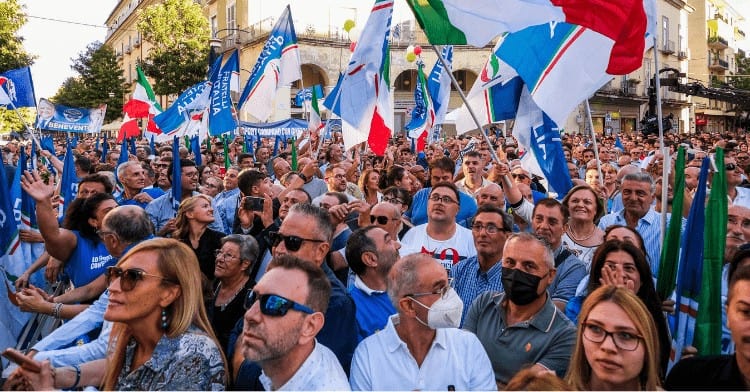The honeymoon for a Meloni-led, right-wing government may prove to be shortlived.

Sunday’s election in Italy saw victory for Giorgia Meloni and her Fratelli d’Italia, with 26 per cent of preferences, in a coalition with the Lega and Forza Italia which summed to 43.8 per cent of votes for the lower Chamber of Deputies. In the coming days Meloni will prepare a government team to propose to the president of the republic, Sergio Mattarella.
Amid record abstention—only 64 per cent voted—Fratelli d’Italia scored a remarkable advance: in the 2018 election it had obtained just 4 per cent. In the process, it overturned the balance within the right-wing coalition, whose overall vote was less than many analysts and pollsters had predicted, especially due to the disappointing performance of the Lega—at 8.8 per cent half its tally of over 17 per cent in the 2018 election (not to mention the 33 per cent it secured in the European Parliament election a year later).
With the media around the world questioning, not without reason, the ideological roots of the figure who will in all likelihood be Italy’s next prime minister, there will also be concerns within the European Union institutions, first and foremost the European Commission. Reaction in the financial markets will meanwhile be key in a country which has to service a public debt of over one and a half times gross domestic product.
Stormy waters
The election stemmed from the collapse in July of the administration led by the technocrat former president of the European Central Bank, Mario Draghi. In 2018, about two weeks after the installation of the ‘yellow-green’ government formed by the populist combination of the Five Star Movement (M5S) and the Lega, it was already apparent that Italy could represent a political space alternating technocratic and populist governments:
… the irrational nature of populist economic policies triggers crisis and turmoil, favouring indirectly the recourse to top-down approaches by national and supra-national elites … However, their action is often unsupported by transparent democratic legitimacy, especially when the tasks at hand consist of implementing severe cuts in spending upon social policies. This, in turn, fosters a reinforcement of populist movements, with the process following that pattern …
Compared with 2018, mutatis mutandis, the next populist government is about to have to navigate very narrow spaces and, if possible, even more stormy waters. We have a pandemic still far from defeated, a bloody war unleashed in Europe and a rate of inflation, particularly due to the energy crisis, not seen in decades.
Sensitive dossier
A very sensitive dossier which will pass from Draghi to Meloni will be the management of Italy’s €222 billion national recovery and resilience plan (PNRR), drawing on grants and loans from the €750 billion NextGenerationEU stimulus fund. In interviews, members of Fratelli d’Italia have hinted (as indeed does their political programme) at a ‘re-discussion’ of how and where to allocate the PNRR resources.
In June 2021, the commission president, Ursula von der Leyen, personally brought to Draghi the commission’s endorsement of the existing Italian plan. Asked about the looming election last Thursday, von der Leyen said: ‘If things go in a difficult direction—and I’ve spoken about Hungary and Poland—we have the tools.’ This brought heated reaction from right-wing coalition figures.
It is however improbable that the next government, having dispensed with the swaggering tones of the election campaign, will set itself on a collision course with the EU institutions. Pre-announced welfare cuts (especially to the citizenship income heavily supported by the M5S) and allocation of resources to ‘traditional’ families—with a view to halting Italy’s demographic decline (the first point of the Fratelli programme)—may well mean the commitments of a Meloni-led government will, on paper anyway, be not so costly and less risky, in terms of possible disputes with the EU.
Polarising issues
That government may focus, initially at least, on policies less burdensome in economic terms but which set down a ‘cultural’ marker—immigration and other issues cast in nativist identity terms, touching on education and sport, the family and religion. In times of semi-permanent electoral campaigning, it will indeed be in the interest of the new government, and especially Fratelli d’Italia, to try to dominate with a high-volume narrative in a political context in which leaderships easily crumble—as with the Lega’s Matteo Salvini—if media attention is not kept constantly on polarising issues.
The next government will face a honeymoon which promises to be very short, given such a complicated European and international context. But if it can hold on and strengthening itself domestically, then it could begin to turn the tide at the European level, starting with the European Parliament election in 2024. Meloni is president of the European Conservatives and Reformists right-wing family, of which the Spanish Vox, the ruling Polish Law and Justice party and the Sweden Democrats are all also members.
Valerio Alfonso Bruno is a research fellow at the Università Cattolica del Sacro Cuorein Milan. He is co-author with James F Downes and Alessio Scopelliti of The Rise of the Radical Right in Italy: A New Balance of Power in the Right-wing Camp (Ibidem and Columbia University Press, 2024).

